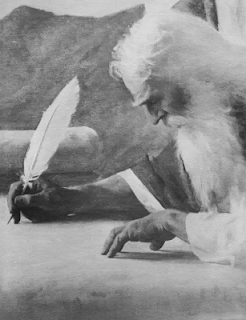 |
| Isaiah's sins are purged. |
We also learned some symbolism in regards to Isaiah's calling that I thought you might like to see visual images for:
 |
| Tabernacle by night |
 |
| Tabernacle by day |
 |
| Veil of the Temple looking through to the Holy of Holies and the Ark of the covenant. |
 |
| The Mountain of the Lord |
President
Gordon B. Hinckley explained that 2 Nephi
12:2–5 refers to the Salt Lake Temple:
“Ever since the Salt
Lake Temple was dedicated, we have interpreted that scripture from Isaiah … as
applying to this sacred house of the Lord. And of this place, since the day of
its dedication, an ever-increasing number from across the world have said in
effect, ‘Come ye, and let us go up to the mountain of the Lord, to the house of
the God of Jacob, that He might teach us of His ways, that we might walk in His
paths’” (“An Ensign to the Nations, a Light to the World,” Ensign, Nov. 2003, 82).
President Gordon B. Hinckley speaks of the significance
of temples:
“These unique and
wonderful buildings, and the ordinances administered therein, represent the
ultimate in our worship. These ordinances become the most profound expressions
of our theology. I urge our people everywhere, with all of the persuasiveness
of which I am capable, to live worthy to hold a temple recommend, to secure one
and regard it as a precious asset, and to make a greater effort to go to the
house of the Lord and partake of the spirit and the blessings to be had
therein” (“Of Missions, Temples, and Stewardship,” Ensign, Nov. 1995, 53).
Another example of dualism occurred when Isaiah foresaw the consequences for the extravagant dress and actions of
worldly women in his own day and in the future. 2 Nephi 13:16–26 describes what he saw.
Although Isaiah specifically addressed “the daughters of Zion,” his words also
apply to men. The way that we dress and portray ourselves has a profound impact upon the society in which we live. Women in particular have a powerful affect on others in their association.
President Joseph
Fielding Smith explained that Isaiah’s warning to the “daughters of Zion”
applies to men as well as women: “The standards
expressed by the General Authorities of the Church are that women, as well as
men, should dress modestly. They are taught proper deportment and modesty at
all times. It is, in my judgment, a sad reflection on the ‘daughters of Zion’
when they dress immodestly. Moreover, this remark pertains to the men as well
as to the women. The Lord gave commandments to ancient Israel that both men and
women should cover their bodies and observe the law of chastity at all times” (Answers to Gospel
Questions, comp. Joseph Fielding Smith Jr., 5 vols. [1957–66], 5:174).
For credit as a makeup lesson, answer the following questions and turn them in to Sister Colvin by 10/31. They will also count as 10 points/question for the team competition.
For credit as a makeup lesson, answer the following questions and turn them in to Sister Colvin by 10/31. They will also count as 10 points/question for the team competition.
A. Isaiah then tells us about a group of people who kept their covenants in 2 Nephi 14:2–6. Look for Isaiah’s description of this group of people.
- What words or phrases indicate that this group was different from the other groups we examined?
- Identify the three specific places Isaiah mentioned that would provide spiritual protection to the righteous and what those places might be for us today.
- When have you felt the Lord’s protection or guidance in your home or at church?
- When have you found spiritual relief or protection in the temple?
- What kind of people will dwell in the homes and worship in the churches and temples described in verses 5–6? See also Moses 7:18
- What can we do to make our homes and branches or wards places of defense against the world?
In chapters 12–15 of 2 Nephi we learn that keeping our
covenants brings blessings of spiritual protection, while breaking covenants
leaves us without the Lord’s protection. You can create in your own
lives an environment like that described in 2 Nephi
14:5–6.
C. Read 2 Nephi
15:26. The phrase, the Lord
will “lift up an ensign to the nations" refers to a standard,
flag, or banner
that is used as a rallying point or as a signal to assemble, especially in
battle. President Joseph Fielding Smith said: “That ensign [is] the
Church of Jesus Christ of
Latter-day Saints, which was established for the last time, never again to be
destroyed or given to other people. It was the greatest event the world has
seen since the day that the Redeemer
was lifted upon the cross and worked out the infinite and eternal atonement. It
meant more to mankind than anything else that has occurred since that day” (Doctrines of
Salvation, 3 vols. [1954–56], 3:254–55).
- In what ways is The Church of Jesus Christ of Latter-day Saints “an ensign to the nations”?
- Think about all the blessings you have received and the truths you have learned as a member of the Church. What is one truth you could share with others that might help them gather to the “ensign to the nations”?

No comments:
Post a Comment